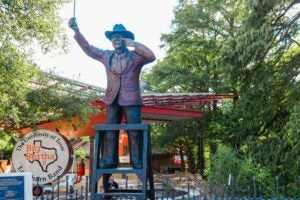Dr. Seo Koo Yoo, a graduate of the School of Social Work‘s master’s and doctoral programs, is an assistant professor at Soongsil University School of Social Welfare in Seoul, Korea. Recently, Yoo spent a week in Austin with a delegation of eight Korean school social workers. The Korea Association of School Social Workers implemented the “Overseas Training Program for Social Workers” in 2001. The program supports Korean social workers so they can be equipped with knowledge and skills that can be applied to the Korean school environment.
Yoo answered a few questions about the group’s experience at his alma mater.
Why was The University of Texas at Austin chosen for this educational visit?
The Korea Association of Social Workers has implemented the “Overseas Training Program for Social Workers” since 2001, supported by Samsung and Community Chest of Korea. Up until now, more than 550 social workers have had the opportunity to learn new paradigms of global social work and advanced strategies by studying in leading social work nations and communities for their training. The main reason that our team chose the UT School of Social Work (SSW) and Communities in Schools (CIS) Central Texas for the training site is the appreciation of their exceptional commitment and services for school-based social work for the last two decades. Since we know the UT SSW has been formulating a culture of genuine collaboration with diverse stakeholders of communities, we feel we are blessed to have this great opportunity to hear and share experiences regarding helping children and youth with multiple challenges.
What does it mean to you to be able to bring students to your alma mater?
To me, introducing Korean coworkers and trainees to UT is like opening the doors and bridging them to their new support system that has unexpected hospitality and wisdom. During my graduate work (M.S.S.W. class of ’98 and Ph.D. in Social Work in ’03), I received a ton of support from my teachers, staff and friends whom I met around the 40 Acres (still, I could not find a proper expression to show my gratuity for people whom I owe too much to). Despite the short stay (Jan. 30-Feb. 6), I bet they would have enjoyed the same levels of support that I have been given for more than seven years.
What do you hope the group takes away from this experience?
From this wonderful opportunity, I wish the group gets a sense of “community.” In spite of geographical distances and contextual differences, school social workers in both societies share common missions and visions for helping children and youth in need. I wish my team members acknowledge that another group of people, who live more than 7,000 miles away from them, are working with clients and communities for change under the same values and spirits.
Was there an experience that you thought was most beneficial to the group?
For the team, all visits and interviews were priceless chances for understanding wonderful works of school-based programs and services for children, families and communities. From agency visits to UT Elementary and CIS campuses, our team members learned a lot and were very moved to observe how school social workers creatively do their job for their students and communities. Especially, we could hear every staff emphasize “relationship,” “partnership” and “collaboration” to serve clients the best.
What are the differences and similarities between school social workers from Korea and those from Texas?
On seeing that there are common challenges in school-based social work both in Korean and Texas, Korean school social workers feel that they are not alone to fight for more resources and recognition from the society. However, Korean school social workers envy Texan workers for having more generous inner-agency support and collaboration, and for having more generous support from nonprofit organizations and private sectors.
Image courtesy of Dr. Seo Koo Yoo



